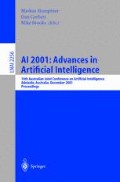Abstract
The Apriori algorithm’s frequent itemset approach has become the standard approach to discovering association rules. However, the computation requirements of the frequent itemset approach are infeasible for dense data and the approach is unable to discover infrequent associations. OPUS_AR is an efficient algorithm for association rule discovery that does not utilize frequent itemsets and hence avoids these problems. It can reduce search time by using additional constraints on the search space as well as constraints on itemset frequency. However, the effectiveness of the pruning rules used during search will determine the efficiency of its search. This paper presents and analyses pruning rules for use with OPUS_AR. We demonstrate that application of OPUS_AR is feasible for a number of datasets for which application of the frequent itemset approach is infeasible and that the new pruning rules can reduce compute time by more than 40%.
Access this chapter
Tax calculation will be finalised at checkout
Purchases are for personal use only
Preview
Unable to display preview. Download preview PDF.
References
R. Agarwal, C. C. Aggarwal, and V. V. V. Prasad. Depth first generation of long patterns. In Proc. Sixth ACM SIGKDD Int. Conf. Knowledge Discovery and Data Mining (KDD2000), pages 108–118, Boston, MA, August 2000. ACM.
R. Agrawal, T. Imielinski, and A. Swami. Mining associations between sets of items in massive databases. In Proc. 1993 ACM-SIGMOD Int. Conf. Management of Data, pages 207–216, 1993.
S. D. Bay. The UCI KDD archive. [http://kdd.ics.uci.edu] Irvine, CA: University of California, Department of Information and Computer Science., 2001.
R. J. Bayardo. Efficiently mining long patterns from databases. In Proc. 1998 ACMSIGMOD Int. Conf. Management of Data, pages 85–93, 1998.
R. J. Bayardo, R. Agrawal, and D. Gunopulos. Constraint-based rule mining in large, dense databases. Data Mining and Knowledge Discovery, 4(2/3):217–240, 2000.
C. Blake and C. J. Merz. UCI repository of machine learning databases. [Machinereadable data repository]. University of California, Department of Information and Computer Science, Irvine, CA., 2001.
C. Borgelt. apriori. (Computer Software) http://fuzzy.cs.Uni-Magdeburg.de/borgelt/, February 2000.
S. H. Clearwater and F. J. Provost. RL4: A tool for knowledge-based induction. In Proc. Second Intl. IEEE Conf. on Tools for AI, pages 24–30, Los Alamitos, CA, 1990. IEEE Computer Society Press.
J. Han, J. Pei, and Y. Yin. Mining frequent patterns without candidate generation. In Proc. 2000 ACM-SIGMOD Int. Conf. on Management of Data (SIGMOD’00), Dallas, TX, May 2000.
S. Morishita and A. Nakaya. Parallel branch-and-bound graph search for correlated association rules. In Proc. ACM SIGKDD Workshop on Large-Scale Parallel KDD Systems, volume LNAI 1759, pages 127–144. Springer, Berlin, 2000.
J. Pei, J. Han, and R. Mao. CLOSET: An efficient algorithm for mining frequent closed itemsets. In Proc. 2000 ACM-SIGMOD Int. Workshop on Data Mining and Knowledge Discovery (DMKD’00), Dallas, TX, May 2000.
F. Provost, J. Aronis, and B. Buchanan. Rule-space search for knowledge-based discovery. CIIO Working Paper IS 99-012, Stern School of Business, New York University, New York, NY 10012, 1999.
R. Rymon. Search through systematic set enumeration. In Proc. KR-92, pages 268–275, Cambridge, MA, 1992.
R. Segal and O. Etzioni. Learning decision lists using homogeneous rules. In AAAI-94, Seattle, WA, 1994. AAAI press.
G. I. Webb. OPUS: An efficient admissible algorithm for unordered search. Journal of Artificial Intelligence Research, 3:431–465, 1995.
G. I. Webb. Efficient search for association rules. In The Sixth ACM SIGKDD Int. Conf.Knowledge Discovery and Data Mining, pages 99–107, Boston, MA, 2000. The Association for Computing Machinery.
M. J. Zaki. Generating non-redundant association rules. In Proceedings of the Sixth ACM SIGKDD Int. Conf. Knowledge Discovery and Data Mining (KDD2000), pages 34–43, Boston, MA, August 2000. ACM.
Author information
Authors and Affiliations
Editor information
Editors and Affiliations
Rights and permissions
Copyright information
© 2001 Springer-Verlag Berlin Heidelberg
About this paper
Cite this paper
Zhang, S., Webb, G.I. (2001). Further Pruning for Efficient Association Rule Discovery. In: Stumptner, M., Corbett, D., Brooks, M. (eds) AI 2001: Advances in Artificial Intelligence. AI 2001. Lecture Notes in Computer Science(), vol 2256. Springer, Berlin, Heidelberg. https://doi.org/10.1007/3-540-45656-2_52
Download citation
DOI: https://doi.org/10.1007/3-540-45656-2_52
Published:
Publisher Name: Springer, Berlin, Heidelberg
Print ISBN: 978-3-540-42960-9
Online ISBN: 978-3-540-45656-8
eBook Packages: Springer Book Archive

